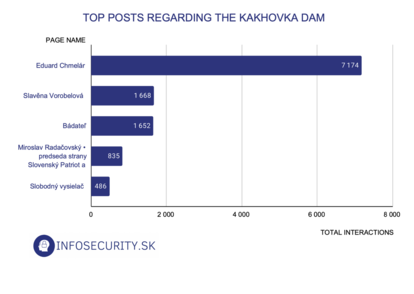Disinformation
Kremlin propagandists are blaming Ukraine for the Kakhovka Dam catastrophe and denying Russia’s involvement

Infosecurity.sk presents an overview of disinformation trends that have been on the rise in information space in the past two weeks:
- Pro-Russian actors spreading Kremlin propaganda deny Russian involvement in the Kakhovka Dam collapse and spread disinformation to support their claims.
- Narratives re-emerged suggesting that Slovak political leaders prioritize Ukraine over their own citizens with the aim of scoring political points.
- Anti-EU narratives referencing Hungary's actions gained popularity. In this context, Hungary is being portrayed as a country resisting the 'Brussels dictate' and defending its autonomy.
The Kakhovka Dam catastrophe becomes a talking point of Kremlin propaganda
In the early morning of June 6, pictures showing the collapse of the Kakhovka dam on the Dnipro River in the Russian-occupied regions of the Kherson area of Ukraine swiftly disseminated across media outlets worldwide. The massive 18 billion cubic meters of water contained by the Kakhovka Reservoir downstream was released when the dam was destroyed, resulting in a humanitarian and ecological tragedy. Unsurprisingly, the Kremlin immediately blamed Ukraine for the dam's destruction even though it was located in Russian-occupied territory. The narrative, which simultaneously completely denounced any involvement of Russia in the incident, quickly spread across the information space.
Eduard Chmelár, a former presidential candidate and a questionable political commentator who has repeatedly spread pro-Russian disinformation, wrote in a post that the incident “doesn't look like a Russian attack by any stretch of the imagination” and tried to provide evidence for this claim, deflecting all ways in which Russia could be involved in the attack. Furthermore, he attempts to cover up his blatantly pro-Russian stance by claiming that “in war, you can never trust the information of any of the belligerents. But don't trust propaganda of people who know the answers before they even ask the questions.” By making similar assertions, Chmelár presents himself as impartial in this situation, which is not at all consistent with his previous statements. He also suggests that the attack should be investigated before Russia is accused of orchestrating it, even though he himself has already decisively stated that the Kremlin had no hand in it, thus directly pointing to Ukraine.
Russian involvement in the incident was also denied by Slavěna Vorobelová, MP (far-right Kotlebovci-ĽSNS party) who often spreads pro-Russian disinformation. She states that the incident was a false flag operation while providing no evidence for the claim and proceeds to attack the Slovak media and politicians for suggesting that Russia might be involved: “Of course, our opinion-forming media, the main loud trumpets of pro-Western propaganda and all sorts of confused scribblers and liars immediately showered us with guaranteed 100% verified NON-conspiracies, NON-hoaxes and NON-disinformation that the sabotage of the Kakhovka dam could not have been caused by anyone other than Putin himself.” Claims like these fit into the broader framework of pro-Russian sentiment, which tries to discredit mainstream media’s position on the aggression in Ukraine and simultaneously present the Russian recollection of events as the ultimate truth.
Since posts about the Kakhovka incident have been prevalent in Slovak information space in the past two weeks, we also looked at them through an optic of a list of disinformation actors in Slovakia. We used the CrowdTangle analysis tool to analyse the most popular posts on Slovak Facebook that include the keyword “Kakhovka dam“. Posts were evaluated based on the total number of interactions (the sum of all reactions, comments, and shares).

The first place belongs to the aforementioned post by Eduard Chmelár in which he attempts to give a justification for why Russia is not involved in the incident and questions mainstream media.
The second place belongs to a post by Slavěna Vorobelová, in which she calls the incident a “false flag operation” and accuses the media and other actors of spreading “Western propaganda”, thus, similarly to Chmelár, undermining the public trust in reliable sources of information and giving way to pro-Russian narratives.
Badatel, a disinformation site notorious for spreading dangerous conspiracy theories, posted a short post which reads: “Don't believe the mainstream media that the Russians blew up the Kakhovka dam. Why would they endanger Crimea's water supply themselves?” Badatel also repeats the same narrative as the actors mentioned. It tries to provide an explanation as to why Russia was not behind the attack, presenting the move as illogical, while completely ignoring the fact that the Kremlin has been taking seemingly irrational steps for the entire duration of the war with the sole aim of reducing public support for Ukraine.
Miroslav Radačovský, MEP and chairman of the nationalist party Slovenský Patriot (Slovak Patriot), to a great extent, repeated the same talking points. On his Facebook page, he wrote that the designation of Russia as the attacker, in this case, is disinformation and questioned the legitimacy of President Zelensky, the mainstream media and some Slovak actors who say that Russia is probably behind the attack.
Finally, disinformation site Slobodný vysielač (“Free broadcaster”) posted an article, which was written around the aforementioned statements of Eduard Chmelár, and thus helped them to reach a larger audience. This only confirms the fact that in the Slovak information space, disinformation actors are considerably interconnected and repeat the same narratives in an amplifying manner.
Slovak politicians supposedly favour Ukrainians and neglect their own citizens
Since the beginning of the war in Ukraine, several narratives have been present to undermine public support for the country. However, these are not only aimed directly at Ukraine, but also at the actors who openly show their support to it. One of the persistent narratives in relation to this behaviour is that current Slovak political leaders do not care about Slovak citizens, but favour Ukrainians.
Robert Fico, a chairman of the anti-system SMER-SSD party and a former prime minister, wrote in a post that “an avalanche of double mortgage repayments is falling on Slovaks and the government of Zuzana Čaputová sees only war in Ukraine” and presents his party’s way of dealing with the issue.
Furthermore, Milan Uhrík, MEP a chairman of the far-right Republika party, claimed that the government of President Zuzana Čaputová financially supports NGOs dedicated to helping Ukraine but “medical emergency rooms in Slovakia are being cancelled because there is no money for them” continuing with a call on Slovaks to go out and vote and change it.
It is important to state, that a big role in this attitude is played by the fact that elections will take place in September and the largest parties in Slovakia are currently competing for the public's favour. With similar rhetoric, they are trying to make the citizens feel that the situation in Slovakia is in urgent need of a dramatic change, while highlighting their own party as the only one that will provide this reform.
Hungary as a role model in an anti-EU stance
In the last two weeks, we have seen a rise in anti-EU narratives that largely use Hungary's actions as a source of their legitimacy. In this respect, Hungary is portrayed as an ideal case of a country resisting the 'Brussels dictate' and defending its autonomy. Disinformers often use this image as the state that Slovakia should strive to achieve, emphasising the need for stronger cooperation with the country and often portraying a "stronger V4" as an alternative to the EU. The former narratives have been most frequently observed in the context surrounding Hungary’s EU presidency in 2024.
Robert Fico said that “Hungary is one of the smaller countries, with a population of almost 10 million. But it needs to keep its mouth shut because it is sovereign and confident on the European agenda! This is supremely embarrassing. Not to defeat legitimate critics of the unsustainable atmosphere in the EU with convincing arguments! Rather they take away their legitimate right to run the EU for 6 months! That's what we've ended up with!”, which is basically citing all of the main talking points, which praise the Hungarian anti-EU stance.
Furthermore, disinformation site Extra Plus went as far as to claim that the European parliament is considering banning the Hungarian presidency because “the left-wing majority there does not like the Hungarian pro-peace stance” pointing to the country’s pro-Russian attitude expressed throughout the entire duration of the war in Ukraine. However, the concerns stem from something entirely different. The European Parliament claims that Hungary became an “electoral autocracy” that can no longer be considered a “functioning democracy” and expresses doubt that a country which has been found in breach of fundamental EU values multiple times and had its funds suspended can credibly chair one of the main EU institutions.
Project Infosecurity.sk organized by Adapt Institute, which is supported by the Prague office of the Friedrich Naumann Foundation for Freedom, continuously monitors the activities of both Slovak and foreign disinformation actors, but focuses mainly on the former. The project activities are built upon daily monitoring of emerging disinformation, hoaxes, and conspiracy theories in the online information space. This approach allows the analysts to identify disinformation posts and narratives that resonated with the public the most, as well as to find out where they originated, and how they spread and evolved on social media. The report takes the form of a bi-weekly summary of arising trends in the spread of malicious information content online. Based on that, Infosecurity.sk can warn the public about emerging and current trends in the field of disinformation, manipulation, and propaganda.

